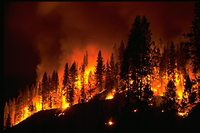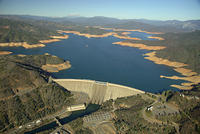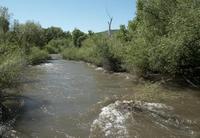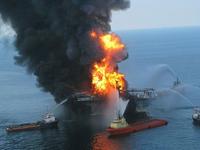-
Senegal climate change-induced flooding reaching crisis proportions: UN

Margareta Wahlstrom, the head of the UN disaster risk, last week warned that climate change-induced flooding had reached crisis proportions in Senegal, with some towns and villages now finding themselves underwater for large parts of the year. Wahlstrom, who was in Senegal for a 3-day visit as part of the UN preparations for a new global disaster risk-reduction strategy, said that mayors of coastal and riverside towns and villages told her their streets were flooded ten months out of twelve.
-
-
Clouds influence how greenhouse gases affect climate
The warming effect of human-induced greenhouse gases is a given, but to what extent can we predict its future influence? That is an issue on which science is making progress, but the answers are still far from exact, say researchers. Indeed, one could say that the picture is a “cloudy” one, since the determination of the greenhouse gas effect involves multifaceted interactions with cloud cover.
-
-
National cyber complex to open next to Ben-Gurion University of the Negev campus
A new national cyber complex called CyberSpark will open at the Advanced Technology Park (ATP) which is located next to Ben Gurion University of the Negev. Fortune 500 companies Lockheed Martin and IBM announced they would invest in CyberSpark R&D facilities, joining other cybersecurity leaders Deutsche Telekom, EMC, RSA, and many startups. The 15-building ATP is the only type of complex of its kind in the world that includes Fortune 500 companies and cyber-incubators, academic researchers, and educational facilities as well as national government and security agencies. The CyberSpark will also include a high school geared toward science and technology.
-
-
Some citizens of low-lying Pacific island nations seeking climate-change refugee status
More and more resident of Pacific island nations and territories are trying to claim refugee status in Australia and New Zealand, arguing that rising sea levels, caused by climate change, are forcing them out of their homes and destroying their livelihood. The New Zealand High Court has rejected the refugee status petition of Loane Teitota and his family, citizens of Kiribati, a low-lying Pacific Island nation near the equator, saying that Teitota’s argument was “novel” and “optimistic.” The court cautioned that if the argument were adopted, then millions of people suffering from the effects of climate change would seek refugee status in New Zealand or any other country.
-
-
The 9 January chemical leak in West Virginia is the latest in a long history of industrial accidents
The chemical spill that affected the water source in nine West Virginia counties in early January is part of a long history of industrial accidents resulting from the concentration of chemical and coal-mining operations in the region. The 9 January spill, which saw coal-cleansing chemical which leaked from Freedom Industries’ storage tank into the Elk River, leaving more than 300,000 residents without access to clean tap water for days, is the latest in a history of pollution which has poisoned groundwater, spewed toxic gas emissions, and caused fires and explosions.
-
-
“Space cops” to help control traffic in space, prevent satellites from colliding

Collisions in space of satellites and space debris have become increasingly problematic. A team of scientists are using mini-satellites that work as “space cops” to help control traffic in space. The scientists used a series of six images over a 60-hour period taken from a ground-based satellite to prove that it is possible to refine the orbit of another satellite in low earth orbit.
-
-
Increase in wildfires may significantly degrade air quality, health in the future

As the American West, parched by prolonged drought, braces for a season of potentially record-breaking wildfires, new research suggests these events not only pose an immediate threat to people’s safety and their homes, but also could take a toll on human health, agriculture, and ecosystems.
-
-
The combination of drought and warming climate places severe strain on California’s water supply

As stores of water in the West are reduced — whether by usage in drought, evapotranspiration in heat, or both — warming temperatures also see the snowpack on the wane. The two phenomena together could put severe strain on water supplies, with implications for ecosystems, industries, and people alike. Even at their most severe, the droughts of decades and centuries past did not occur in tandem with today’s degree of temperature change or have to contend with the demands of a population that in California alone now numbers above thirty-eight million residents. As needs for water grow ever greater, so, too, do the potential threats to its supply.
-
-
Cal Poly unveils ambitious cybersecurity educational initiative
Cal Poly, with a grant from the Northrop Grumman Foundation, has established a Cybersecurity Center, opened a new cyber lab, and is developing a cybersecurity curriculum with an ambitious set of goals in mind: educating thousands of students in cybersecurity awareness and readiness; producing experts in cyber technologies and systems, including many professionals who will serve the military and defense industry; and graduating cyber innovators who are prepared for advanced study and applied research in emerging cyber issues.
-
-
The world likely to face more frequent, and more severe, blackouts

U.S. household electricity usage increased by 1,300 percent between 1940 and 2001. In the last few decades, air conditioning has been the greatest factor in increased electrical consumption, and one of the greatest sources of systematic strain, with considerably more blackouts occurring in the summer months than during winter. The electricity used to fuel America’s air conditioning is currently of a similar volume to the U.S. entire energy consumption in the 1950s. A new study reveals that today’s occasional blackouts are dress rehearsals for the future, when they will occur with greater frequency and increased severity. Power cuts will become more regular around the globe as electrical supply becomes increasingly vulnerable and demand for technology continues to grow at an unprecedented rate.
-
-
Natural flood management as a solution against future flooding

Natural Flood Management (NFM) aims to reduce the downstream maximum water height of a flood — the peak — or delay the arrival of the flood peak downstream, increasing the time available to prepare. Back-to-nature flood schemes which use the land’s natural defenses to slow river flow and reduce flooding could be a cost-effective way of tackling one of the biggest problems facing the United Kingdom today.
-
-
Deepwater Horizon: Identifying harmful elements of persisting oil

Scientists are unraveling the composition of persisting oil residues collected from Gulf of Mexico beaches following the Deepwater Horizon disaster, insisting on further assessment of the toxic impact of these chemical remnants on the marine ecosystem. A new study targeted the most abundant compounds in the residual oil, dissecting their composition with unprecedented accuracy. This is important for understanding the environmental impact of persisting oil remnants, because ecotoxicologists have demonstrated that all three chemical groups can be harmful to living organisms. More worrisome, relatively little is known about the broader toxicity of saturates and oxygenated hydrocarbons in the marine ecosystem, like the Gulf of Mexico —where there are 223 offshore oil rigs — even though these compounds constitute most of the persisting oil.
-
-
ExxonMobil to pay fines for violations at its Baton Rouge chemical facilities
In a settlement with Louisiana’s Department of Environmental Quality (DEQ), ExxonMobil is ordered to pay $2.329 million to address violations from 2008 to 2013 at its greater Baton Rouge facilities. ExxonMobil was cited for a series of problems at its refinery and resin-finishing and chemical plants in East Baton Rouge Parish, and its tank-farm facility in West Baton Rouge.
-
-
Halting bugs’ crop destruction in India saves up to $309 million
Researchers who first discovered a devastating pest in India and devised a natural way to combat it have now put an economic value on their counterattack: up to $309 million the first year and more than $1 billion over five years. This is the amount of damage the papaya mealybug would have wreaked on farmers and consumers in India without scientists’ intervention. The winning intervention centered on three natural enemies of the mealybug — three parasitic wasps from Mexico— which the U.S. government first employed in Florida after the pest spread there in the late 1990s.
-
-
Israel considering earthquake-proofing important Biblical-period structures
Israel is located in one of the world’s earthquake-prone areas, along the friction point of the African and Arabian tectonic plates.Officials in Israel are taking preventative measures to protect the country’s most important ancient sites from earthquake damage. Engineers from the University of Padua in Italy have installed sensors throughout the Tower of David, one of Jerusalem most important historical sites, to determine what sort of earthquake-proofing may be needed. Some experts opined that in the event of an earthquake, Jerusalem’s most ancient structures might actually be the city’s most dependable. “If they still stand after so many earthquakes during the last 2,000 years, they must be good structures,” one of them said.
-
More headlines
The long view
Autonomous Vehicle Technology Vulnerable to Road Object Spoofing and Vanishing Attacks
Researchers have demonstrated the potentially hazardous vulnerabilities associated with the technology called LiDAR, or Light Detection and Ranging, many autonomous vehicles use to navigate streets, roads and highways. The researchers have shown how to use lasers to fool LiDAR into “seeing” objects that are not present and missing those that are – deficiencies that can cause unwarranted and unsafe braking or collisions.
Tantalizing Method to Study Cyberdeterrence
Tantalus is unlike most war games because it is experimental instead of experiential — the immersive game differs by overlapping scientific rigor and quantitative assessment methods with the experimental sciences, and experimental war gaming provides insightful data for real-world cyberattacks.
Prototype Self-Service Screening System Unveiled
TSA and DHS S&T unveiled a prototype checkpoint technology, the self-service screening system, at Harry Reid International Airport (LAS) in Las Vegas, NV. The aim is to provide a near self-sufficient passenger screening process while enabling passengers to directly receive on-person alarm information and allow for the passenger self-resolution of those alarms.
Falling Space Debris: How High Is the Risk I'll Get Hit?
An International Space Station battery fell back to Earth and, luckily, splashed down harmlessly in the Atlantic. Should we have worried? Space debris reenters our atmosphere every week.
Testing Cutting-Edge Counter-Drone Technology
Drones have many positive applications, bad actors can use them for nefarious purposes. Two recent field demonstrations brought government, academia, and industry together to evaluate innovative counter-unmanned aircraft systems.
Strengthening the Grid’s ‘Backbone’ with Hydropower
Argonne-led studies investigate how hydropower could help add more clean energy to the grid, how it generates value as grids add more renewable energy, and how liner technology can improve hydropower efficiency.
